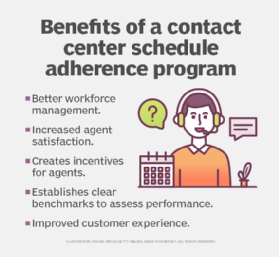contact center schedule adherence
What is contact center schedule adherence?
Contact center schedule adherence is a standard metric used in business contact centers to determine whether contact center agents are working the amount of time they are scheduled to work. Schedule adherence is measured by taking the total time a contact center agent is scheduled to work and dividing it by the time they are actually available for calls, expressed as a percentage.
The following formula is used to calculate the adherence percentage:
Contact center schedule adherence percentage = (actual time available for calls / total time scheduled to work) x 100
For example, if a contact center agent was supposed to work 8.5 hours, but only worked 8 hours, their contact center schedule adherence percentage would be 94.1%, or 8 hours divided by 8.5 hours, then multiplied by 100.
Factors considered in calculating contact center schedule adherence
Contact center schedule adherence takes into account the following activities:
- Time spent on calls or availability to take calls.
- Time spent on breaks.
- Time spent doing other non-call-related work.
Companies commonly use high adherence rates to assess contact center performance and schedule compliance, but they should also measure agents' ability to adhere to contact center internal policies regarding communication and workflows.
Most call centers and contact centers define a target schedule adherence percentage that allows for an additional cushion beyond scheduled lunch and breaks.
In modern contact centers, managers use software to ensure agents' conformance in real time. They can also access other adherence metrics, such as calls per hour and average handle time, which measures the average length of a customer interaction using the following formula:
AHT = (total talk time + total hold time + total after-contact work) / number of total calls
All these metrics are used cumulatively to assess and improve schedule adherence and to ensure a staff member is being utilized optimally.
The benefits of using a contact center schedule adherence program
Among the benefits of a contact center schedule adherence program are the following:
- Better workforce management. Managers can improve workforce management, including more informed staffing decisions and the ability to better forecast workloads.
- Increased agent satisfaction. Agents who know the exact number of hours they will be working will find it easier to schedule their work-life balance.
- Incentives for agents. Setting a target motivates agents to work the appropriate number of hours on providing service, thereby increasing productivity.
- Clear benchmarks to assess performance. Managers can quickly evaluate which agents bring high value by looking at their schedule adherence. By using contact center adherence schedules as a metric, agents are more likely to comply with the schedule.
- Improved customer experience. Increased working hours translates into less wait time for customers and can go a long way to ensure adherence to service-level agreements and increased customer satisfaction.
Contact center schedule adherence best practices
To ensure a contact center schedule adherence program has the highest likelihood to succeed, implement and measure the following best practices:

- Define the target schedule adherence percentage. Most contact centers strive for an 80% schedule adherence rate, as 100% is considered unrealistic.
- Implement agent scheduling software to ensure real-time adherence in the contact center.
- Evaluate schedule adherence cumulatively with other performance metrics, such as average handle time and calls per hour.
- Periodically review the target schedule adherence percentage to ensure it still meets customer service goals.
- Use schedule adherence as an incentive for agents to work the appropriate number of hours.
- Celebrate high achievers and coach low performers on improving their schedule adherence.
- Communicate expectations around adherence to all staff members involved in the contact center operation.





